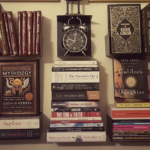It’s always a pleasure conversing with someone who’s truly well read. Someone who’s conscientious and has a knack of bringing specific aspects of an issue into sharp focus, that often don’t even surface in otherwise regular discussions. It really comes as a breath of fresh air to see someone use unique analogies and have a novel perspective on things and a style of assessing them, that’s born of the sheer breadth of knowledge that they’ve accrued over time, all the while retaining their sense of awe, wonderment, humor and originality.
There are people whose wisdom and humbleness really comes through in a conversation, in how factually grounded they are, in the caution they exercise while making assumptions, in the caveats they offer while drawing conclusions, in how honest they are about the stuff they’re not sure of, in the time they take before forming an opinion, in how unmoved they remain in the face of logical fallacies and provocations, in how fearless they are in saying what’s important even if it’s not socially palatable and in how open they remain to new arguments and evidence.
The demographic of those aspiring for the Civil services is one where one might come across such people, although they’re still painfully difficult to come by even amongst them. Mediocrity has a way of precipitating even among the studious. After all leaving aside the regular school textbooks, in spite of a wider than usual syllabus and access to overflowing bookshops, their core knowledge base seldom goes beyond 9 or 10 books on average. Most are reference books that they sift through and pick and choose from what’s actually relevant for the exam concerned, a mere economical value addition.
And you can’t really blame them. It’s a different game that they’re playing. When you’re jam packed in a competitive environment, techniques must be devised that are more economical and rewarding and ones that assist you in becoming a memory athlete. Multiple revisions, brute force memorisation, short notes, mnemonics, information retention and quick retrieval are the holy grail here. Everything is a race against time, to one up the person next to you. The faster you can get things on paper, the more presentable, comprehensive and convincing the answer, the better it is. The game is not so much about the finer nuances but about learning all the right tropes that would help maximise the marks one can extract. The lowest common denominator of anything and everything that they do continues to be one that would help them clear the examination in question. And the game essentially ends at that.
It’s precisely because of this that any conversation with such a person often leaves much to be desired. I remember coming across a strange but hardcore Christian convert once, who approached me after having seen me speak somewhere in Delhi. All I can say is that in more than an hour that I spent debating him, as we stood outside a metro station, he was not at all prepared for the kind of arguments I had for him. Here was a guy who had been preparing for civil services for the past 3 years, and had decisively cleared different stages of the exam, who did not believe in evolution through natural selection and literally thought that the world was 6000 yrs old. For him existence came into being not 13.8 billion years ago, but ‘after’ the domestication of dog. Not that someone like him is representative of most aspirants, but as much as there are truly inspiring and hard working personalities in this segment of people, it’s still a realm that’s impressively brimming with sanctimonious, self aggrandising morons who believe that true wisdom, maturity and the deepest of insights and lessons that life has to offer come distilled in nearly compiled packages of VisionIAS. Everything is just shaved down to the parochial statistic of +2 -1, and how much can be regurgitated wisely in 7.5 min for an answer.
It can at times also be quite amusing to watch the lengths to which students go to avoid conceding directly that the assurance of power, prestige and comfort in the bureaucracy, are also incredibly lucrative incentives for them to work so hard to be in the IAS or the Indian Administrative services. Biting the bullet at this point seems to undermine their willingness to ‘serve’, which ideally should be a sufficient enough reason for their hard work and repeated attempts. An overt confession of this kind also casts an inconvenient selfish glare of self absorption on what would’ve otherwise been an impressively righteous pursuit.
It’s best to strike a balance between relaxed casual learning and purposefully cramming in stuff within a deadline. And in any case, real knowledge is for the most part driven not by an urge to ace some test but by simple curiosity, courageous questioning, honest reflection and the sheer love to know.





